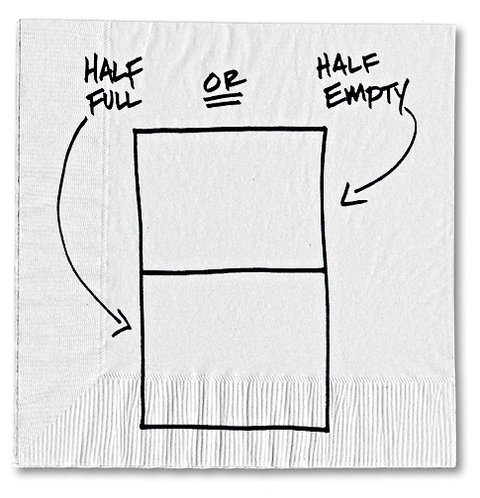 Carl Richards
Carl Richards
Carl Richards is a financial planner in Park City, Utah, and is the director of investor education at the BAM Alliance. His book, “The Behavior Gap,” was published last year. His sketches are archived on the Bucks blog.
Last year, I read “Bright-Sided” by Barbara Ehrenreich. Her argument that positive thinking was undermining America was fascinating, but I also thought it was slightly unmooring.
I found myself questioning my long-held belief that life is better when approached with a positive attitude. Now, it’s easy to see how some forms of positive thinking can create problems. The most obvious is the version where people think that if they believe something is true long enough, the universe will reward them.
So while I understand the dangers of being too positive or blindly optimistic, I’ve found that things do go a little better when I approach life with a positive attitude. This has been particularly true with how I view money, but it can be a tricky balance between being just positive enough and too positive.
It’s a bad idea, for instance, to spend money as if you have already reached some level of success that you have yet to achieve. I’ve seen this play out in my own life. Imagine that your income has increased each year for the past few years, so you start projecting that trend into the future. While this projection may seem harmless, it can turn into a problem if you start to spend as if it will happen instead of waiting until next year’s bonus hits your bank account.
So where do we draw the line? Here’s where “just positive enough” begins to morph into “too positive.”
1. You see opportunities instead of problems.
We all know that we can take the same experience and view it as a problem or an amazing opportunity. With some of the fundamental shifts taking place in our national employment situation, looking for opportunities needs to become more common.
Here’s a perfect example. A friend of mine is always worried. She tends to think that her job is about to be eliminated (maybe) and that long-term prospects for the next generation are grim (possibly). At the same time, I’m constantly meeting recent college graduates who are excited and amazed that the barriers to starting a business have come down so far.
Chris Guillebeau’s recent book, “The $100 Startup,” is a good example of this line of thinking. Never before has it been so easy to start a business — and have almost instant access to more than a billion people for whatever you create.
Same situation, different viewpoint.
2. You bring a good attitude to work.
A positive attitude won’t save your job or guarantee that you get another one. But it seems that most employers prefer having more positive people around than negative ones. You probably know from personal experience that it’s easier to be around people everyday when they’re positive.
In fact, we know of employers that hire based on attitude. They feel as if they can teach people how to do the job if they come with the right attitude. Of course, skills still matter, but given the chance to hire two people with equal skills, the one with the positive attitude wins.
3. You look for the positive to get through rough spots.
There may be some study that contradicts me, but it has helped me to live my life believing that things will work out. I know we need to be careful, and we can’t expect the universe to bail us out. But life does have a way of resolving even the most difficult situations.
Tough times pass eventually. Things get better after a while. And even if they don’t, what good does it do being grumpy?
I know that hard work and a positive attitude might not always fix things. But in the right doses, a good attitude rarely makes things worse. In fact, we’ve probably all seen how focusing solely on bad things tends to make life that much harder. And noted in “The Atlantic,” it doesn’t take much to make us feel worse:
Researchers, for example, asked people who were mildly-to-moderately depressed to dwell on their depression for eight minutes. The researchers found that such ruminating caused the depressed people to become significantly more depressed and for a longer period of time than people who simply distracted themselves thinking about something else.
I think we’re causing a similar, negative effect when we dwell on money and look for problems.
We stew, we worry, we focus on things that we can’t control, and then we call them problems. The reality is that these things we call problems are often projections of something that may or may not happen in the future. In fact, if you’re being honest, you would probably admit that something you think is a problem now is only a potential future problem.
And that’s where I see the benefit of thinking positive. As The Atlantic article points out, if we focus on the problem, we become “significantly more depressed and for a longer period of time than people who simply distracted themselves thinking about something else.”
Isn’t it more practical (plus better for our mental health) to shift our focus to the opportunities?
For a while, I wondered if I needed to toss out my rose-tinted glasses. But I can’t argue with the fact that my life looks better and feels better when I focus on being just positive enough. So if you’ve been tempted to throw away your glasses, I suggest you give them another try. Despite the books telling us otherwise, I think there’s still something to be gained by looking on the bright side.
Article source: http://bucks.blogs.nytimes.com/2013/03/18/viewing-the-glass-as-half-full-but-not-too-full/?partner=rss&emc=rss